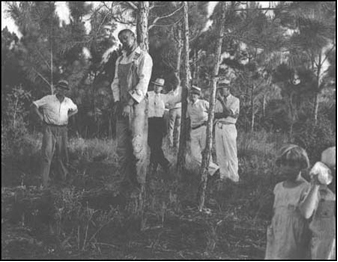
Rubin Stacy, lynched in Fort Lauderdale on 19th July, 1935 (source: www. photobucket.com)
The following poem is written in 1939 by Abel Meeropol. This poem is a protest against the cruel actions still taken against Afro-Americans, even though they were technically free people. One of the horrors was that whenever a black man got in a conflict with a white person, he would be blamed and punished severely for it, even until death.
A famous case is the lynching of Rubin Stacy a migrant worker
who was accused of having frightened and threatened a white woman. He was then
taken by an angry mob of white men and lynched without any However, should there
have been a trial the poor man would not have had any chance. Franklin Roosevelt,
the president supported the lynching because he’d otherwise loose a lot
of votes of white men in the south.
The trials during that time were extremely biased. Many of the men in the jury
were looking for someone to blame for the unfortunate accidents happing in the
society during that time, such as bad harvesting and financial setbacks, The
south was suffering of poverty during the 1930’s. The men acted as if
it was their duty to lynch blacks in order to protect the society of these great
dangers. “In reality Rubin only went to the white woman’s house
to ask for food reported the newspaper: The Times later.” She got scared
when she saw him and this already sealed his faith. He was hanged in front of
Marion Jones’ house, who had made the complaint. Unfortunately he was
not a single case. Many more innocent Afro-Americans have died unjustly. If
you are interested in more stories follow this
link.
As seen in the picture the white men were proud that they have rid the world
of another black person. Also take notice of the two small children. Lynches
were a spectacle for the society; everyone would dress up and watch the proceedings.
Thousands would attend and in some cases children would get a front seat so
that they could see the spectacle clearly.

Rubin Stacy, lynched in Fort Lauderdale on 19th July, 1935 (source: www. photobucket.com)
Strange fruit – Abel Meeropol , 1939 (source: www.spartacus.schoolnet.co.uk)
Southern trees bear a strange fruit,
Blood on the leaves blood at the root,
Black body swinging in the southern breeze,
Strange fruit hanging from the poplar trees.
Pastoral scene of the gallant South,
The bulging eyes and the twisted mouth,
Scent of magnolia sweet and fresh,
And the sudden smell of burning flesh!
Here is a fruit for the crows to pluck,
For the rain to gather, for the win to suck,
For the sun to rot, for a tree to drop,
Here is a strange and bitter crop
This poem is written after the author; A. Meeropol had seen the picture of Robin
Stacy. It is a protest which seemed to be unnoticed but in fact it was published
in New York Teacher and later in the Masses, a Marxist magazine. Billy holiday
performed an altered version of his poem which made it in the top 20 in July
1939. It therefore can be concluded that his message was successfully spread
across the nation, despite the fact that others called it a propaganda campaign
for the National Association for the Advancement of Coloured People (NAACP).
The poem has rhyming couplets which make it easy flowing and
almost song like. This is very ironical if you keep in mind the horrible images
which a lynching would bring to mind. It makes the poem sound happy when you
would read it however the opposite, sadness and horror, is clearly presented.
The author also makes great contrast between the smell of flowers and the smell
of burning flesh (stanza 2 line 3 and 4) as well as the ‘pastoral scene’
which gives the reader a positive peaceful image in contrast to ‘bulging
eyes and twisted mouth’ of stanza 2 line 1 and 2 which give an detail
real-life description of the horrible scene. All of these contrasts are presented
to shock the reader and to make them start thinking about the horrible scenes
they are performing.
Another point that is significant is the imagery of ‘fruits of the south’.
The south of the USA was known for their fruit and sweets but, during the 1930’s,
they were known for their lynching actions as the author actually means ‘dead
Afro-Americans’ with this.
Especially stanza 3 is describing the situation and the attitude of the Southern
white people very well. It shows how little people care about the Afro-Americans
and still don’t recognise them as real human beings. Instead of burying
or cremating the body they leave it on the tree in a warning for other potential
villains. They let the body rot and don’t care what would happen to it
because the poem states: ‘fruits for the crows to pluck’.